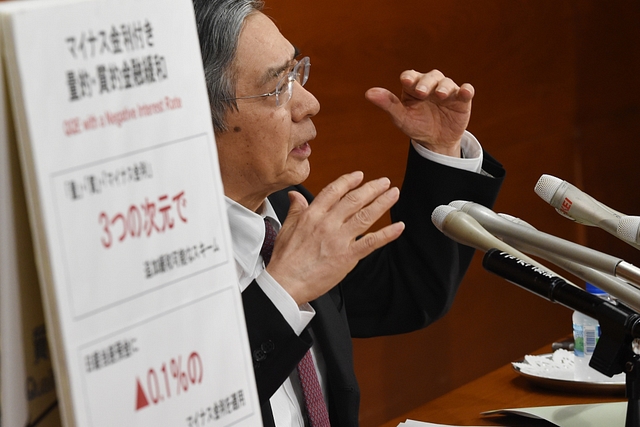
Meaning Of Japan's Negative Interest Rate: Monetary Snake Oil Isn't Working Anymore
The world is back to a situation where there are no clear answers to economic issues. Another global recession is probably lurking around the corner
Would you keep money with a bank that charges you for keeping your money with it instead of giving you interest? Obviously you would be better off keeping your cash under your pillow, or digging a hole in your garden, if you have one. Even better, you should be thinking about spending it since your money is going to lose value by saving it with a bank.
Yesterday (29 January), the Bank of Japan (BoJ) expressed the hope that savers, especially corporate savers, would just do that – take their money out of bank current accounts and spend or invest it. It announced that it would charge a fee of 0.1 percent for certain categories of current accounts. Charging a fee for some accounts means you will be paying the central bank for keeping your money with it.
This makes Japan the second major central bank to think that the way out of a negative spending mindset would be to ask people to pay it money for holding savings or unspent balances. “Through the minus interest rate combined with quantitative easing, I hope we can support companies and individuals in breaking their deflationary mindset,” BoJ Governor Haruhiko Kuroda said.
A year-and-a-half ago, the European Central Bank (ECB) announced that it will charge banks 0.3 percent for parking their overnight funds with it – thus pushing them to explore better bets in lending money. Now Japan is doing the same, after years of following a near-zero interest rate policy. Apart from Japan and the ECB, even the US ran a near-zero money rate since 2008. The US Fed only last month raised rates, but one wonders if it was lighting a candle when the winds of recession are blowing elsewhere.
So what are the implications of two major economic powers deciding that negative rates are the only way to get growth up?
First, it means that monetary policy is not working. There is something more fundamentally wrong with their economies, and trying to make money cheaper may not get growth rates up.
Second, in a world where central banks are trying to force banks to lend and people to save less, it is doubtful if the US Fed can go in the opposite direction. If Japan will give you money for nearly free, who will borrow in dollars in the US?
Third, we are probably close to another global recession. Japan, Europe and China are all slowing down, and US may be getting there. Clearly, the slack in the world cannot be fixed just by easy money.
Fourth, India will get no help from a reviving global economy, but cheap money can now flow into Indian stocks and debt, as Indian assets are looking cheaper. But this depends on how risk-averse global investors are. India’s growth will thus depend on what we do here, not what happens abroad. Ironically, even as our central bank frets about the possibility of fiscal deficits and inflation, Japanese and ECB moneymen are praying for higher inflation. In this scenario, keeping our rates high in relative rates may not be necessary.
Fifth, clearly, the world’s major economies should shift the focus of revival efforts to the fiscal side, and also to enacting more fundamental reforms.
The world is back to a situation where there are no clear answers to economic issues. Neither the snakeoil of Keynesianism nor the frankincense of monetarism is working. New solutions are needed.